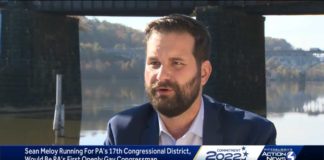SAN FRANCISCO – Long before the repeal of Don’t Ask, Don’t Tell in 2011, San Francisco was once a major hub for LGBTQ servicemembers.
During World War Two, the military sought out and removed gay soldiers with a Blue Discharge. Many of them also faced rejection by their families when they returned home. Since those fighting in the Pacific were processed out of San Francisco, many of them stayed to form the LGBTS community that we know today.
“I had to hide my identity for a longtime, cause once they found out you were gay, they dropped you,” said Korean War veteran Carl Tebell.
The 89-year-old Tebell is homebound in his San Francisco apartment these days. But he said life now feels so much more open and free than his younger days.
“We were treated as low class citizens.” said Tebell.
His story exemplified how so many gay service members ended up in San Francisco and shaped the city’s LGBTQ community.
“I joined the Navy because both my father and my brother were in the Navy,” said Tebell.
Following in the family tradition, Tebell who grew up on an Illinois farm, joined the Navy in 1953 during the Korean War when he was 20 years old.
Later in that same year, the Navy kicked him out with a “bad conduct” discharge after someone outed him as being gay. He said he hid his discharge paper under a floorboard in his Illinois family home and didn’t tell his family.
“‘Your father got discharged honorable, your brother got discharged honorable, but not you, it’s something you have to hide.’ So I had to hide it from the very beginning,” recounted Tebell on why he hid the discharge from his family.
Without an honorable discharge, he couldn’t find good work back in Illinois. So in the late 50’s, Tebell moved to San Francisco to start a new life.
“It gave me the freedom I wanted. You know, I didn’t have to hide my identity out here,” said Tebell.
At the time, San Francisco had a growing gay population because of its military installations. World War Two brought hundreds of thousands of service members from across the country to the port city.
Aside from the military, Tebell said San Francisco and the surrounding regions had a lot of good paying defense related jobs where employers never asked to see discharge papers. And that attracted outed veterans from all over the country.
“I was discharged with an undesirable discharge,” said Helen James, a 94-year-old Korean War veteran.
James was kicked out of the Air Force in 1955 for being a lesbian.
“I went directly to California because I had to leave my family and friends.” Said James. “I couldn’t talk to them and I was ashamed and embarrassed.”
In California, LGBTQ servicemembers found strength in numbers, acceptance, and new careers. Over time, San Francisco became a gay mecca.
“The LGBT community has come a long way,” said Tebell.
The story doesn’t end there. With the help of attorneys, the military upgraded both James and Teball’s discharges to honorable more than six decades later.
“The PTSD didn’t stop. But it freed me internally (from) my shame, you know, to have carried that as long as I did,” said James.
“I’m proud of having this (honorable) discharge now. It took a long time to get it. But I finally got it,” said Tebell.
For Tebell, no more hiding and not more shame. He came out to his surviving relatives.
“Now that they accept me, I think it’s wonderful,” said Tebell.









